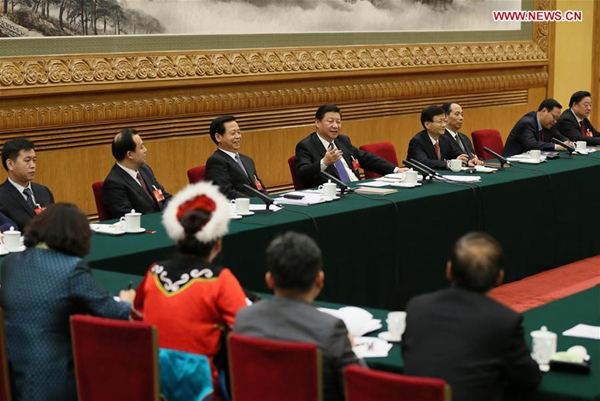'Two Sessions' 2016: the leadership gets a grip
- By Tim Collard
 0 Comment(s)
0 Comment(s) Print
Print E-mail China.org.cn, March 9, 2016
E-mail China.org.cn, March 9, 2016
|
|
|
Chinese President Xi Jinping joins a group deliberation of deputies from Heilongjiang Province to the annual session of the National People's Congress in Beijing, capital of China, March 7, 2016. (Xinhua/Lan Hongguang) |
Following the Spring Festival break, in accordance with established custom, the assembled leadership of China meets to set out a political course for the coming year. It is not normal for the announcement of the program to contain any surprises: the general direction of travel has already been set out in the shape of an integrated and ongoing reform program, combined with a tightening of discipline in the structures of the state and Party.
It is clear, however, that no government, however well-organized and clearly focused, can control the entire environment in which it operates, and thus any practical program needs to contain reactive as well as proactive elements. This is especially clear in times of global economic uncertainty and market turmoil, such as China has experienced - along with most of the rest of the world - in the second half of 2015.
Premier Li Keqiang, in his annual work report to the NPC, spoke of a "battle for growth" - it will not come about simply through government fiat. Accordingly, the growth target for 2016 has been revised downwards, which itself forms part of a pragmatic pattern; it has become clear that the stellar growth figures China saw in the years 1990-2010 cannot be sustained indefinitely, not because anything has gone wrong but because a period of consolidation necessarily follows a period of rapid expansion.
The key to sustained prosperity will now come not in growth spurts but in structural reform, to which China has clearly committed herself, not only as regards the domestic economy but as a blueprint for global stability, as she showed at the recent G20 Finance Ministers' meeting. And the leadership remains convinced that structural reform requires a tight grip on the levers of society to ensure that the necessary steps can be taken without leading to social unrest. The need for a gradual shift in the economy from the traditional dependence on manufacturing and industry towards the growth of service industries and the rise of a consumer economy will inevitable lead, at least temporarily, to a rise in unemployment, as all Western economies have discovered. And anything that renders livelihoods insecure is a potential source of social instability, something which all Chinese governments are keen to prevent.






